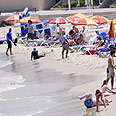
Tel Aviv beach
צילום: ניב קלדרון
Report: Global warming disastrous for Israel
Israel Union for Environmental Defense publishes report detailing potential consequences of global warming in Israel. Report says ‘Tel Aviv shoreline could reach Ibn Gvirol Street’
Israel’s environment is headed for disaster, according to a report by Adam Teva V’Din, the Israel Union for Environmental Defense (IUED).
The report was presented as part of a campaign titled “Take a minute, save a generation”, aimed at educating the public about global warming as part of the struggle against the phenomena.
The report detailed the consequences of global warming in Israel as published by United Nations climate scientists.
In the worst-case scenario, Israel’s sea level could rise by 5 meters, causing flooding of low-lying areas. In such a case, places such as Haifa’s Bat Galim neighborhood would be wiped out, and Tel Aviv’s shore could reach Ibn Gvirol Street.
Executive director of IUED, Tzipi Iser Itzik, said the report was published with hopes of bringing the issue to the public agenda.
“Our goal is to illustrate the expected effects of global warming on the State of Israel, and to mobilize policy makers to take the initiative in joining the international effort to deal with climate changes,” Itzik said.
According to the IUED, 1,100 people die annually from pollution in the Tel Aviv metropolitan area alone.
Coastal buildings at risk
According to the report, the best-case scenario is a 3.3 degree temperature rise during the summer, a 33 percent drop in general precipitation, and a rise in the number of heavy rains.Such changes could severely hurt Israel’s water economy and speed up desertification, according to Hanoch Ilsar, one of the report’s authors.
“A rise in Mediterranean sea level, even by 0.5 meters, under the optimistic assumption that the ice caps won’t melt, could harm ports and power station cooling pools,” he said.
The report also foresees increased erosion of coastal gravel cliffs, which can be found in Hadera, Netanya, Herzliya, Tel Aviv, Rishon le Zion, Ashkelon, and other coastal cities, putting nearby buildings at risk of collapsing. Drainage systems will be compromised, increasing the risk of flooding.
IUED’s ecology expert, Aharon Dotan, said that Israel’s natural ecological systems also stood to sustain damage as a result of global warming.
“Species of flora and fauna unique to Israel, such as the Gilboa Iris and Eilat’s coral reefs, could become extinct,” Dotan explained. “The warming and rise in heat waves could cause wider distribution of disease-carrying insects such as mosquitoes, ticks, and flies.”










